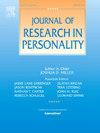When psychopathy plays nice: Self-construal moderate the relationship between psychopathic traits and prosocial behaviors
IF 3.1
2区 心理学
Q2 PSYCHOLOGY, SOCIAL
引用次数: 0
Abstract
Psychopathy is often conceptualized as an antisocial construct, with limited attention given to its expression of prosocial behaviors. This study investigated how interdependent and independent self-construal moderate the relationship between psychopathic traits and different forms of prosocial behavior in a large Chinese community sample (N = 1,519). Using a three-factor model of psychopathy (Egocentricity, Callousness, Antisocial), our analyses revealed that interdependent self-construal significantly moderated the expression of egocentric traits. Specifically, interdependence strengthens the positive association between egocentricity and public prosocial behaviors while attenuating its negative links to anonymous and altruistic prosocial behaviors. The moderating role of independent self-construal was less consistent, weakening the negative effects of egocentricity traits on altruistic helping while strengthening the antisocial traits negative links. These findings support the moderated-expression model of psychopathy, highlighting self-construal as critical contextual cues that moderate the expression of psychopathic traits relating to prosocial behaviors. Implications for the role of sociocultural factors in understanding prosociality among individuals with psychopathic traits are discussed.
当精神病患者表现良好:自我解释调节精神病患者特征与亲社会行为之间的关系
精神病通常被概念化为一种反社会的构造,很少关注其亲社会行为的表达。本研究以1519名华人社区为样本,探讨了相互依存和独立自我解释如何调节精神病特征与不同形式的亲社会行为之间的关系。采用自我中心、冷酷无情、反社会三因素模型分析发现,相互依存的自我解释显著调节了自我中心特征的表达。具体而言,相互依存强化了自我中心与公共亲社会行为之间的正相关关系,减弱了自我中心与匿名和利他亲社会行为之间的负相关关系。独立自我解释的调节作用不太一致,削弱了自我中心特质对利他性帮助的负面影响,强化了反社会特质对利他性帮助的负面影响。这些发现支持精神病的调节表达模型,强调自我解释是调节与亲社会行为相关的精神病特征表达的关键上下文线索。本文讨论了社会文化因素在理解具有精神病特征的个体的亲社会行为中的作用。
本文章由计算机程序翻译,如有差异,请以英文原文为准。
求助全文
约1分钟内获得全文
求助全文
来源期刊

Journal of Research in Personality
PSYCHOLOGY, SOCIAL-
CiteScore
5.40
自引率
6.10%
发文量
102
审稿时长
67 days
期刊介绍:
Emphasizing experimental and descriptive research, the Journal of Research in Personality presents articles that examine important issues in the field of personality and in related fields basic to the understanding of personality. The subject matter includes treatments of genetic, physiological, motivational, learning, perceptual, cognitive, and social processes of both normal and abnormal kinds in human and animal subjects. Features: • Papers that present integrated sets of studies that address significant theoretical issues relating to personality. • Theoretical papers and critical reviews of current experimental and methodological interest. • Single, well-designed studies of an innovative nature. • Brief reports, including replication or null result studies of previously reported findings, or a well-designed studies addressing questions of limited scope.
 求助内容:
求助内容: 应助结果提醒方式:
应助结果提醒方式:


